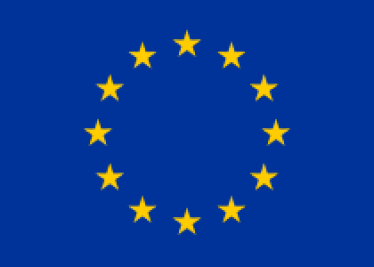Caravan Residency program at Alexandria – Discovering the residence
Following the first phase of the ‘Caravan Residency Program: Thinking with Alexandria’, held in Biella, it is now the turn of the exploration of the current, but historical, Alexandria. This is a fundamental phase for the project as, through the symbolic and historical prism of this Egyptian city, the urban systems of the subsequent European destinations envisaged by the project are analysed. The sixteen international artists deepened their knowledge of the North African city through lectures, film screenings, discussions with local experts and urban walks.
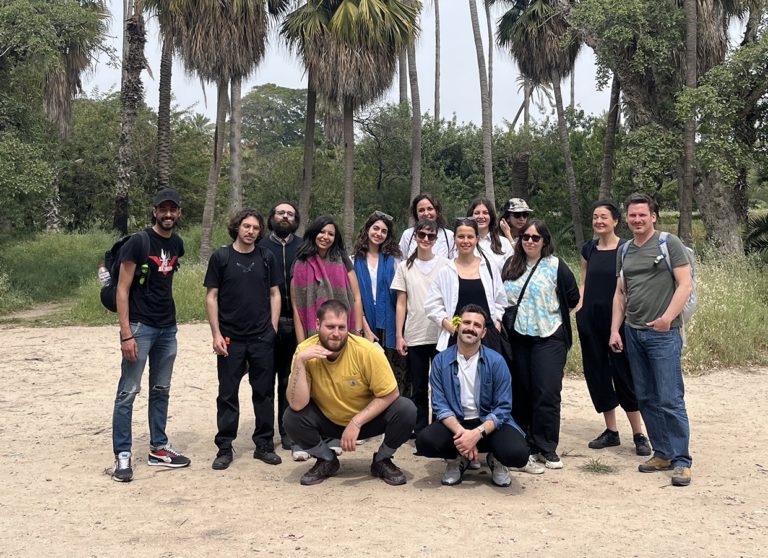
Giving voice to innovative reflections on the relationships established between creation, culture, heritage and the development of the modern Mediterranean and European metropolis: this was one of the missions of Alexandria: (re)activation of common urban imaginaries, a project aiming to offer a fresh look at the numerous challenges faced by the arts and heritage sectors, through the symbolic and historical prism of the city of Alexandria and its influences on urban development in the Mediterranean and beyond. With this in mind, sixteen creatives were selected for the Caravan Residency Program: Thinking with Alexandria project and participated in nomadic residencies around Europe and Egypt over six months of research.
In February in Biella, all together, they were able to start tackling the first themes and give rise to the first discussions related to the creation, culture, heritage and development of the modern Mediterranean and European metropolis in relation to the influences of Alexandria. Subsequently, the group moved to Alexandria and then, divided into groups, the artists confronted the cities of Athens, Brussels, Marseille and Nicosia.
Within the ‘Caravan’ programme, the actors of the different experiences were not only the sixteen internationally selected artists, but also the local organisations of the partner cities and the five social entrepreneurs, one for each residency. The social entrepreneurs were the figures with the task of guiding the residents along this path and putting them in contact with the social fabric of reference.
The second stage of the ‘Caravan’ programme, which took place in the city of Alexandria from 21 March to 2 April 2022, initially represented a sort of continuation of what had emerged during the week’s residency in Biella, but under different circumstances. However, after the first few days of settling in and discussions with local experts in Alexandria, the discovery of the chimerical port city began. Through visits inside historical and public spaces, including the archives of the ‘Centre d’Études Alexandrines’, and through urban walks, first with the guidance of Omar Nagati (director of CLUSTER) and then with the freedom to get lost in the ancient streets of the Egyptian city, the group got to know the current artistic and cultural scene of Alexandria.
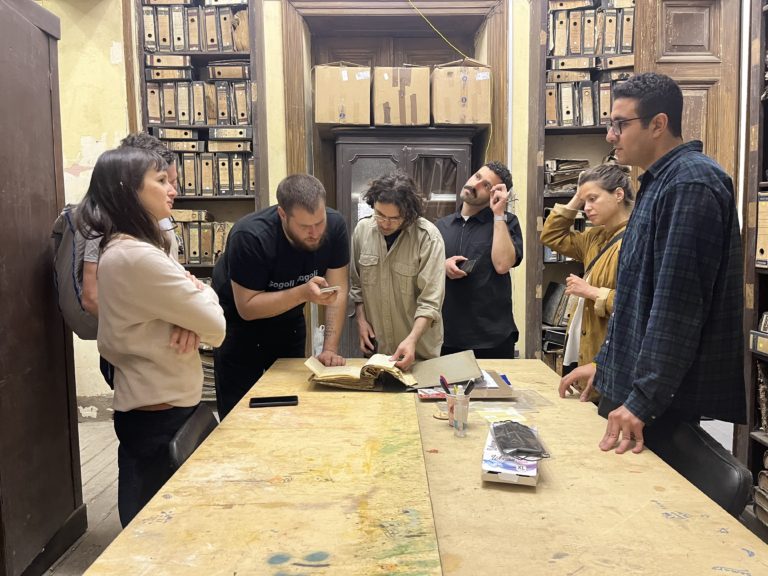
Conversations and debates with local experts selected by the cultural manager, curator and social entrepreneur for the project, Sarah Baghat, were crucial in broadening the participants’ knowledge. For example, Marwa Abdel Gawad, cultural mediator and head of the pedagogical service of the Centre D’Études Alexandrines, addressed the topic of water by expounding on the symbolic role that this natural element represents for the inhabitants and recounting the history of Alexandria’s water system. Furthermore, in order to learn more about Alexandria’s heritage, residents had the opportunity to interact with four local artists who presented their multidisciplinary projects. Among them was Mohamed Adel Dessouki, an artist and architect, who, showing his project Save Alex, explained his intention to save and document the city’s historic buildings from demolition by rapid development, reclaiming infrastructure as a public good. Furthermore, through the creation of a fictitious archive that collects different testimonies and narratives, the architect sought to demonstrate how, in certain cases, the facts disclosed by the government do not actually represent an absolute truth, but rather, are one side of a broader story characterised by further versions.
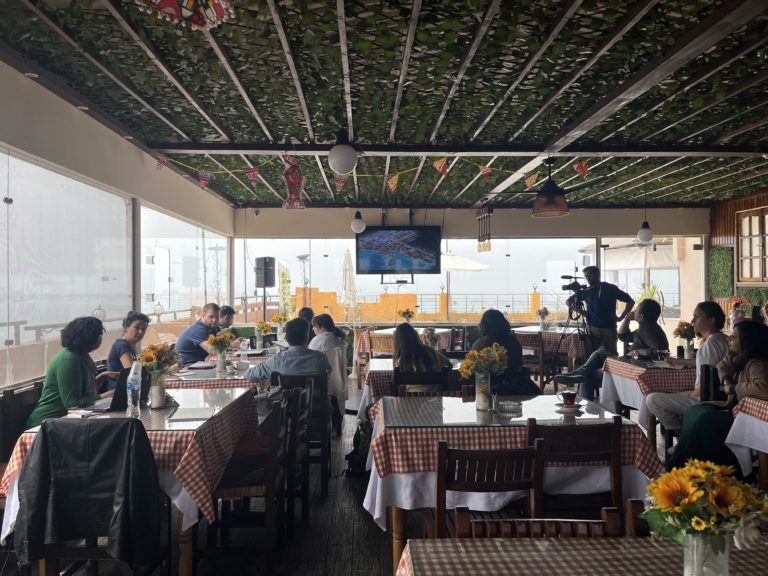
In contrast, the photographer and researcher Yasmine Hussein wanted to direct her art, i.e., her photos, towards the depiction of three historical gardens in Alexandria in order to show a symbol of the city’s social practices and its evolution over the years. Even more different was the meeting with the visual artist, publisher and writer Mohamed A. Gawad, who showed his virtual studio, presenting his work and revealing his concerns about water and society.
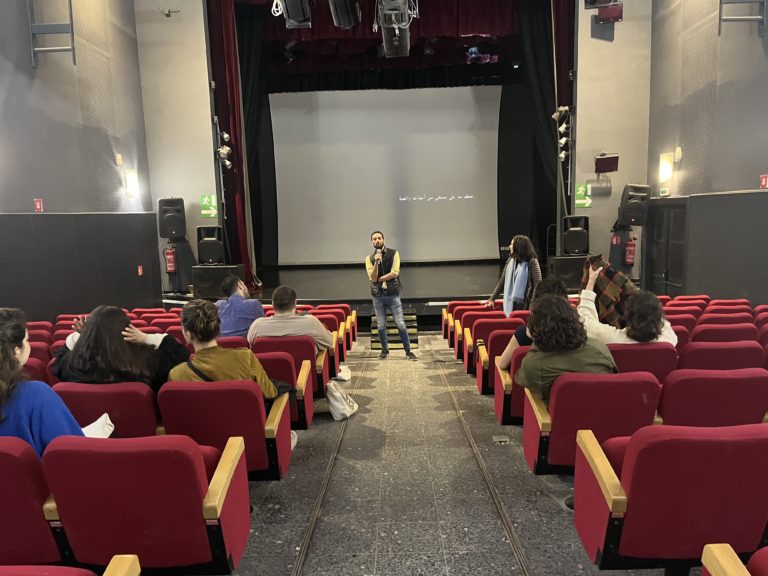
Moreover, the visual art of cinema also played an important role in the Alexandria residents’ experience. Indeed, in addition to a visit to Behna Films, dedicated to the preservation of films and related promotional materials belonging to the flourishing period of Egyptian cinema from the 1930s to the 1950s, film screenings of documentaries and experimental videos were organised at the theatre of the Institut Français d’Egypte. The latter were co-curated by director Mohamed Zedan and Sarah Bahgat, and consisted of short documentaries and experimental videos, all directed by Alexandrian filmmakers, showing the city, its inhabitants and ‘contradictions’ between 2010 and 2022. The conclusion of both weeks of residency in Alexandria was organised around a collective discussion with the presence of the project curator Sarah Rifky, who remotely participated in the discussions regarding the two weeks spent in Alexandria, both from a local and international point of view.
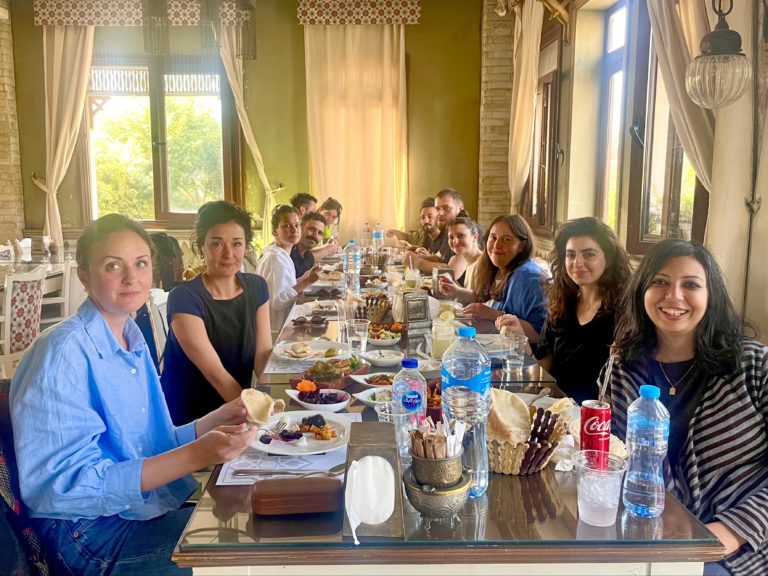
The protagonists of the second residency in Alexandria
The programme was curated by social entrepreneur and curator Sarah Bahgat, produced by B’Sarya for arts, in collaboration with the Institut Français d’Egypte à Alexandrie.
The local experts: Omar Nagati (Director of CLUSTER), Marwa Abdel Gawad (researcher at Centre d’Etudes Alexandrines), archivist and photographer Yasmine Hussein, artist Mohamed A. Gawad, academic and artist Mohamed Adel Dessouki and filmmaker Mohamed Zedan.
The participants of the first week (21/03/2022 – 26/03/2022) were: Islam Shabana (Egypt), Sara Fakhry Ismail (Egypt), George Moraitis (Greece), Latent Community (Sotiris Tsiganos + Ionian Bisai, Greece), Nina Kurtela (Croatia), Mark Lotfy (Egypt), Stella Ioannidou (Greece), Alexandre Field (SE Marseille) and Demetra Ignatiou (Nicosia). While, those in the second week (28/03/2022 – 2/04/2022) were: Neja Tomsic (Slovenia), Chiara Cartuccia (UK, Italy), Onur Çimen (Turkey), Post Disaster (Gabriele Leo + Grazia Mappa) (Italy), Virgil b/g taylor (US/Germany), Lodovica Guarnieri (UK, Italy), Mahmoud El Safadi (Lebanon), Omnia Sabry (Egypt), Zeynep Kaserci (UK, Turkey), Pauline de la Boulaye (SE Brussels) and Electra Karatza (SE Athens).
Sarah Baghat, the social entrepreneur of the Alexandria residency
In charge of managing, guiding and mapping the second stage of the Caravan programme in Alexandria, Egypt, was Sarah Baghat. She is a Cairo-based cultural manager with extensive experience in the fields of film, literature, visual arts and music. While curating public programmes at Egypt’s flagship art institution, Townhouse Gallery (2014-2018), she initiated the Townhouse Salons, a monthly series of literary conversations held with artists, writers, cultural historians and critics. After that period and for the past three years, Sarah worked as a project manager at the Danish-Egyptian Dialogue Initiative (DEDI) arts and culture office, an intergovernmental organisation established to promote cross-cultural exchanges between Egypt and Denmark. Her position as a film programmer at the Flemish Netherlands Institute in Cairo (NVIC) allowed her to pursue her passion for independent audiovisual productions. Currently, Sarah is working independently with artists and institutions to develop a diverse portfolio of critical, relevant and socially engaged cultural programmes.
Text: Cittadellarte





